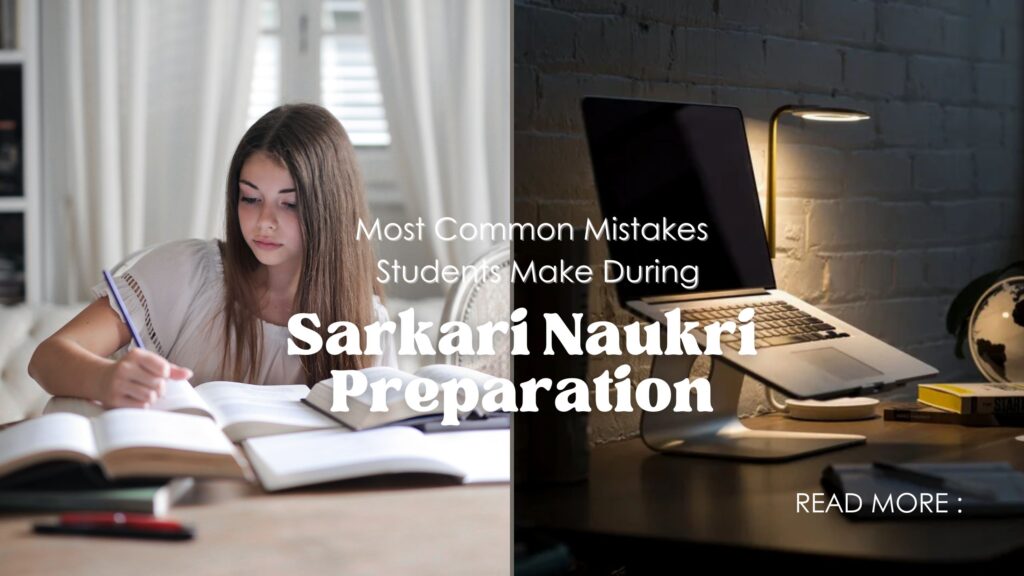
Sarkari Naukri Preparation: For millions of Indian students, the objective of preparing for a Sarkari Naukri exam is undoubtedly a great effort. Each year, thousands of students aspire to acquire a stable, high-paying government job with each job offering benefits and respect. Unfortunately, many of these aspirants, regardless of preparation and disposition to work hard, have troubles along the way to passing these exams. Usually, this is not necessarily a reflection of their ability, but that these students make mistakes they do not realize they are making.
In this article it will stress the most common mistakes Sarkari job aspirants make and how to navigate them.
Mistake 1: Not Having a Clear Study Plan for Sarkari Naukri Preparation
One of the most common errors all aspirants make while studying for the Sarkari Naukri, is studying, without even thinking of any study plan! Students many times start reading books or question papers straightaway, without first checking and understanding the syllabus and pattern of the examination.
Ways to Prevent It
- Before you begin, review the syllabus and the past years’ questions
- You should schedule your studies in daily, weekly, and monthly targets.
- You should be strict with the timing you set, ensure there is reasonable time among all subjects.
Mistake 2: Relying Only on Coaching Classes
Coaching institutes have their own use, but they do not need to become a crutch. A lot of students rely completely on their classroom notes and avoid looking into self-study altogether. This usually limits their understanding of complicated topics.
Prevent it
- Utilize coaching as a compass instead of the only source of learning.
- Make it a point to open your notes at least once a day to review and practice the concepts using self-study.
- Engage with online resources which include: material on non-official sites, government notifications and announcements, and applicable mock tests.
Mistake 3: Ignoring Current Affairs
Current affairs are incredibly important for many Sarkari Naukri exams, particularly in banking, railways, and civil service. Yet, it is often neglected by candidates, for example, by only focusing on static subjects.
Recommendations for Avoiding this:
- Aspirants should read the newspaper every day, such as ‘The Hindu’ or ‘Indian Express.
- Follow among other credible sites that publish current event materials in a PDF format every month.
- Keep a current affairs journal or booklet to facilitate access to resources for revisions.
Keeping up with news or national and international developments will leave you ahead of many others in the competition.
Mistake 4: Poor Time Management
Oftentimes, candidates begin in a motivated way, but later lose sight of it. This is either by overly focusing on an individual subject, or by trying to get through the whole syllabus at once.
How to prevent it:
- Use a time tracker app or planner.
- Allocate fixed hours each day for revisions, practice tests, or down time.
- Do not procrastinate; study regularly, instead of trying to learn with limited time prior.
If you manage your time well, you should learn everything you want to learn and further, ensure that you reduce the stress level you feel leading up to your exam.
Mistake 5: Not Practicing Enough Mock Tests
Mock tests are the cornerstone of good preparation, but many candidates undervalue it. If you do not practice, it becomes a challenge to handle the pressure of time in your exam.
How to avoid it:
- Take at least one full-length mock test once a week.
- Review each test, and work on your weak areas.
- Practice with online exam-simulators that simulate your exam conditions.
Mistake 6: Ignoring Negative Marking
Several government tests have a negative marking system where you lose marks for a wrong answer. Students who forget this will end up guessing every question and losing meaningful marks.
What You Can Do:
- Only guess on a question if you think you have a fair chance.
- Have some planning to reduce your guessing.
- Focus on answers you are certain about, not on getting to 100 questions answered.
Mistake 7: Underestimating the Actual Process of Revision
Preparing is not just about learning new knowledge, but also having the space to retrieve, use and apply it effectively. Many candidates study a new topic each day but often do not review earlier topics. This results in not remembering much, if anything, when it comes time to write a test.
How to Combat This:
- Plan to review your studies every weekend.
- Each week, write summary notes or flashcards for each topic.
- Make sure you go over significant formulas, dates, and concepts on a regular basis.
Mistake 8: Neglecting Mental and Physical Health
Getting ready for Sarkari Naukri can be stressful. Many candidates put immense pressure on themselves – sometimes giving up sleep, social and personal life, and good physical health – which hampers attention and ability to perform and to think straight.
How to Avoid It:
- Maintain balanced meals and exercise regularly
- Sleep for at least seven hours each day
- Continue to practice relaxation like meditation or just plain breathing
Mistake 9: Following Too Many Studies Materials
Another common mistake is buying every textbook or guide you can get your hands on. This can cause confusion and produce an excess of information. Students will often get off track and waste time studying inefficiently.
How to prevent it:
- Be selective and use quality study resources that have been approved by toppers or subject matter experts.
- Avoid switching textbooks frequently.
- Focus on concept understanding and material learning versus collecting material.
Mistake 10: Lost Patience/Motivation
The Sarkari Naukri exam may be the most competitive exam one will take, and there may be a semester or two before one receives a score they are comfortable with. Many candidates stop after a couple of try, usually indicating that it was not meant to be.
How to Combat It
- Remember why you began this journey.
- enjoy small wins.
- invest time with positive, supportive people.
How to Develop a Successful Sarkari Naukri Strategy
Every aspirant of the test must have discipline, effective planning or creating a sense of coherence and the capacity to deal with differential situations to perform optimally. In concluding, here is an example of what a good process looks like:
- Be thorough in research regarding the exam pattern.
- Set effective, measurable daily and/or weekly goals.
- Study subject areas in the order of importance starting with the basic level and moving up to advanced.
- Practice taking mock exams/tests and review them regularly.
- Continue to improve weaker sections consistently.
- Continue to stay connected on the official government websites for future updates.
Conclusion
Mistakes are to be expected in every learning process, however, if you can detect and rectify them early, it will be great. In the case of the latest government Jobs, it is not about the number of hours you studied, but rather about the quality of the study method; with little preparation, hard work, and a positive attitude, soon you will be ready for success.






